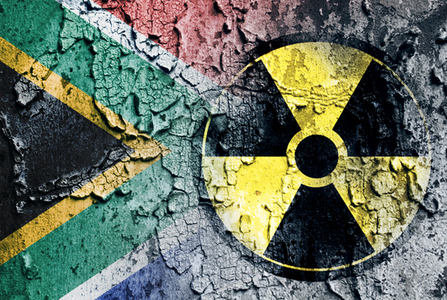1,000 signatures reached
To: Mr Moonsamy, National Nuclear Regulator
Say No to Nuclear Plans in Thyspunt by 31 July 2021
The public comment deadline has passed. Thank you to all those who sent in objections. We will keep you updated. For more information and to stay involved, visit https://safcei.org and https://earthlife.org.za/
.jpg)
South Africans have until 31 July to say no to a Nuclear Installation Site Licence (NISL) application. Late last year we objected to the building of a new nuclear plant at Duynefontein near the existing Koeberg Nuclear Power Plant. Now Eskom has applied for yet another new site license for Thyspunt, located in the Eastern Cape, to the National Nuclear Regulator (NNR) Board. South Africa cannot afford and doesn't need [1] unsafe [2] and unnecessary nuclear power. Object to Eskom’s plans before it’s too late.
Why is this important?
South Africans have until 31 July to say no to a Nuclear Installation Site Licence (NISL) application. Late last year we objected to the building of a new nuclear plant at Duynefontein near the existing Koeberg Nuclear Power Plant. Now Eskom has applied for yet another new site license for Thyspunt, located in the Eastern Cape, to the National Nuclear Regulator (NNR) Board. South Africa cannot afford and doesn't need [1] unsafe [2] and unnecessary nuclear power. Object to Eskom’s plans before it’s too late.
Nuclear power is dangerous, unhealthy and costly. Nuclear plants – big or small – are very expensive to set up, often with cost overruns and construction delays. The cost of the decommissioning of these plants is also prohibitively costly.
As history has taught us, new nuclear procurement is where large scale corruption can, and has, taken place. In this instance, little to no information has been provided to the public on the cost and feasibility of new nuclear energy. Transparency is needed to build back public trust after past illegal and unconstitutional nuclear deals.
Nuclear power is not needed for our energy grid now or in the future. Especially during the Covid-19 crisis, we should not be looking at procurement of one of the most expensive forms of energy.
The most recent Energy plan, IRP 2019, does not show the necessity for the procurement of nuclear energy. Also no-one can guarantee 100% safety with nuclear energy. Radiation and radioactive waste created at nuclear power stations are extremely toxic. More nuclear power could put the health of workers – most-likely younger people – and communities close to the plants at risk.
Consider what Electrical Engineer Hilton Trollip points out, “We absolutely do not need Koeberg to avoid load shedding. There are documented and proven sustainable electric systems that can run very well without nuclear and even without coal.” We should instead move toward a just energy transition, investing in and supporting renewable energy sources. Not only is RE able to create a more inclusive energy landscape – giving formerly-excluded communities more of a chance to be part of the economy – the risks associated with RE are significantly less.
References:
https://ewn.co.za/2017/04/26/western-cape-high-court-rules-sa-nuclear-deal-unlawful-and-unconstitutional
https://theconversation.com/why-decommissioning-south-africas-koeberg-nuclear-plant-wont-be-easy-89888#:~:text=The%20potential%20cost%20of%20decommissioning,UK%20model%20at%20R76%20billion
https://www.iol.co.za/news/south-africa/western-cape/safety-concerns-over-koeberg-nuclear-plant-as-cape-town-tremors-grow-in-intensity-74d7b088-2840-41ee-a8a7-a40fa83451ee
Nuclear power is dangerous, unhealthy and costly. Nuclear plants – big or small – are very expensive to set up, often with cost overruns and construction delays. The cost of the decommissioning of these plants is also prohibitively costly.
As history has taught us, new nuclear procurement is where large scale corruption can, and has, taken place. In this instance, little to no information has been provided to the public on the cost and feasibility of new nuclear energy. Transparency is needed to build back public trust after past illegal and unconstitutional nuclear deals.
Nuclear power is not needed for our energy grid now or in the future. Especially during the Covid-19 crisis, we should not be looking at procurement of one of the most expensive forms of energy.
The most recent Energy plan, IRP 2019, does not show the necessity for the procurement of nuclear energy. Also no-one can guarantee 100% safety with nuclear energy. Radiation and radioactive waste created at nuclear power stations are extremely toxic. More nuclear power could put the health of workers – most-likely younger people – and communities close to the plants at risk.
Consider what Electrical Engineer Hilton Trollip points out, “We absolutely do not need Koeberg to avoid load shedding. There are documented and proven sustainable electric systems that can run very well without nuclear and even without coal.” We should instead move toward a just energy transition, investing in and supporting renewable energy sources. Not only is RE able to create a more inclusive energy landscape – giving formerly-excluded communities more of a chance to be part of the economy – the risks associated with RE are significantly less.
References:
https://ewn.co.za/2017/04/26/western-cape-high-court-rules-sa-nuclear-deal-unlawful-and-unconstitutional
https://theconversation.com/why-decommissioning-south-africas-koeberg-nuclear-plant-wont-be-easy-89888#:~:text=The%20potential%20cost%20of%20decommissioning,UK%20model%20at%20R76%20billion
https://www.iol.co.za/news/south-africa/western-cape/safety-concerns-over-koeberg-nuclear-plant-as-cape-town-tremors-grow-in-intensity-74d7b088-2840-41ee-a8a7-a40fa83451ee
.png)